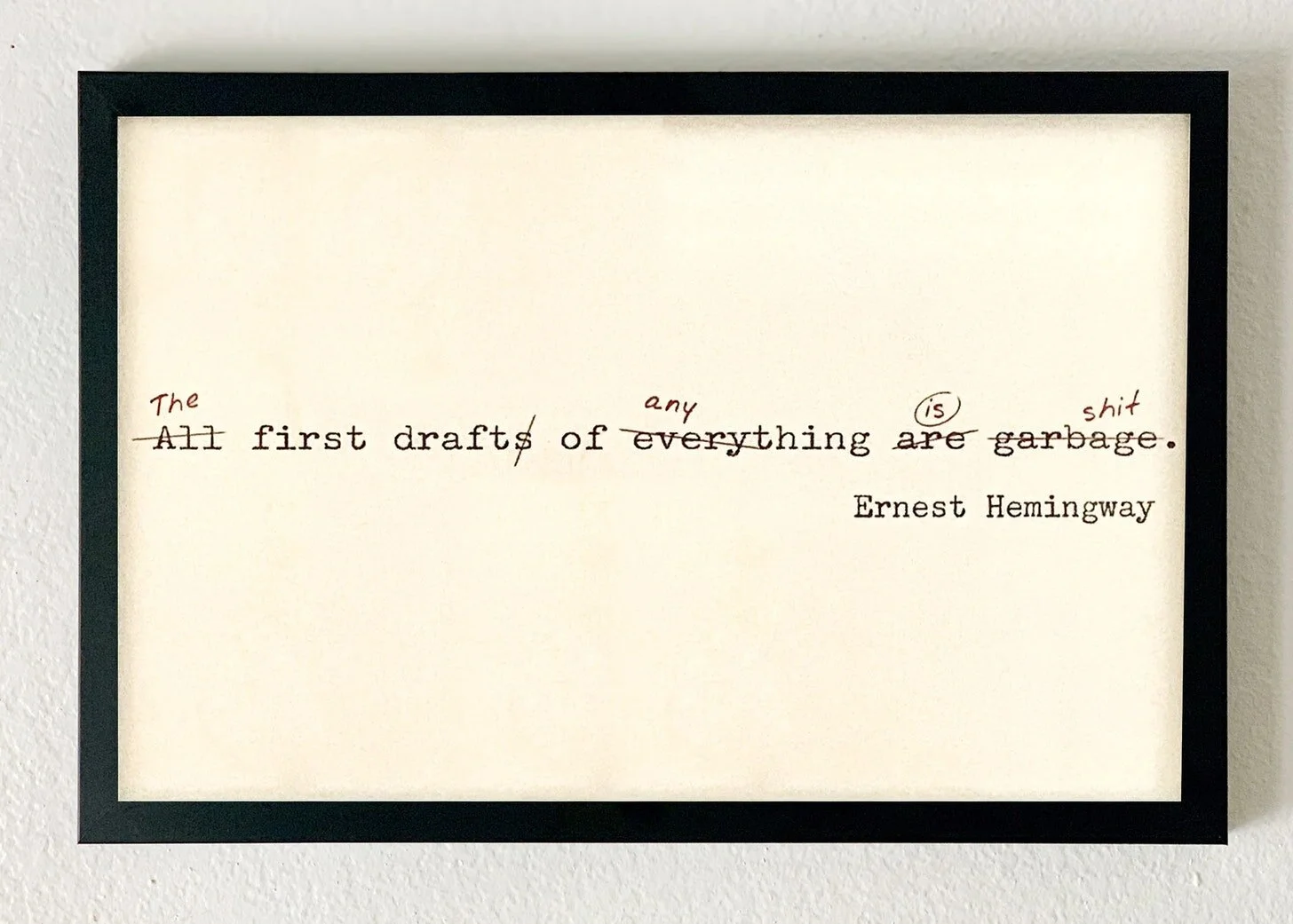Why I Write
Above: Truer Words have never been scrawled (and crossed out, and changed, and rewritten…)
Few people can be as tortured by writing as I am. —Virginia Woolf
It’s 2:00AM and I am exhausted.
I am tired of reworking this draft for the umpteenth time.
I am tired of hunching like Quasimodo in this worn leather chair.
I am tired of the vinyl tiles that checkerboard the ceiling.
I am tired of pecking at my beat-up laptop, of willing coherent prose to appear on the blue screen.
I am tired of being mocked by the staccato palpitations of the black cursor.
I am tired of baring my soul to the world and publishing to deafening silence.
Simply put, I am tired of writing.
It’s Labor Day Weekend, my family is outside gallivanting, and here I am. Upstairs, shut in by the four corners of my dingy, dimly-lit quasi-hermitage.
I have been working on this godforsaken piece (yes, the very one you are taking in, dear reader) for hours on end. All I have to show for it is yet another day of written humiliations.
I lean back — craning my neck and flattening my hunchback — and close my eyes. I ask the Ghosts of Writers Past:
“Why do I do this to myself?”
Thomas Hobbes’ description of life could equally apply to writing. It is indeed “solitary, poor, nasty, brutish, and short.” To that list, I would add: unpleasant, burdensome, enervating.
The process of writing is roundabout, clunky, and halting. The lopsided nature of the input (the grueling exertion) versus the output (the delicate page) is comically unjust.
Extracting the perfect word from the recesses of the subconscious is similar to pulling gum from one’s hair: all pain, little progress. It is excruciating, awkward, and leads to its fair share of stomping and shouting. Frustrated and lost, the writer inevitably turns to omniscient, omnipresent Google to find synonyms and etymologies that satiate the itch of ideation. Alas, it’s no good googling an inkling or a feeling.
But yet, I write. Because for me, writing contains multitudes.
To write is to wade, alone, into the vast, murky ocean of thought and idea. It is equal parts treading water and drowning, a haphazard stumbling toward insight and inspiration. It is plumbing into the depths of your soul, groping around to grab hold of something true and real and unique and you. It is casting and reeling, changing the tackle and hoping that the Big One doesn’t just nibble at your hook, but firmly latches on. And that you can successfully reel it in.
To write is to scrawl dejectedly at a lonely desk on a cold winter’s night. To review once again an accumulation of quotes, notes, mementos, books that are dried out with age. It is to hope against hope that this brittle material will serve as flint, tinder, kindling, and logs that turn the spark of an idea into a roaring fire of creation and creativity.
To write is to know that toil and trouble await within the caves of the subconscious. And yet, to forge ahead in order to excavate an ounce of pure emotion. It is acknowledging the difficult truth that no finished product is more perfect, more moving than an idea in its infancy. It is acquiescing to these truths and still putting pen to paper.
To write is to battle constantly with a gnawing, nagging doubt; to wonder whether all this toil and trouble, mess and struggle is worth it. Whether these mental gymnastics will lead to a medal or an injury or irrelevance or nothing at all. To question whether writing is an exercise in futility. Whether this very essay is ironic in and of itself.
To write is to be in your head all day, alone, with a relentless torrent of thoughts and to know that these ideas resemble fireworks. Some fizzle, others misfire. Some whimper, others boom. And yet, a few choice mental projectiles are truly pyrotechnic: they burst with an ephemeral explosion that lights up the world, the way, just for a brief moment.
Writing is a torturous, invasive business. It is a hardscrabble exercise in polishing, refining, buffering, and exposing unfinished thoughts to the sharpest whetstone of all: the eyes of other people.
The writer’s burden is indeed his gift: to separate the wheat from the chaff of word, phrase, sentence, and paragraph. To metamorphose an observation or instinct or deep-seated feeling onto the page.
Writing offers a propulsive catharsis: if reading is the inhale, then writing is the exhale.
What better feeling is there than letting out a deep breath?
If you couldn’t tell, dear reader, my relationship with writing is complicated. Very complicated.
Indeed, how else could I describe the thing that I loathe but that which allows me to think, to order, to truly, seamlessly communicate.
You see, writing is my small act of rebellion against the entropy of both memory and my disorder
For, it is only through my writing that I can partake in the communication robbed of me by my Tourette syndrome.
Every day, every hour, every minute, my spasms beget stares and my grunts give rise to gawks. Interspersed between cogent ideas and witty remarks is a cacophony of motor and vocal tics that constantly plague me. All too often, guttural grunts, forceful exhalations, mild yelps punctuate my spoken sentences.
My syndrome takes the opportunity to stilt speech and halt verbal progress, Candidly, I don’t think it a coincidence that torture and Tourette are nearly anagrams.
Writing offers a channel by which and through which I express chaotic thoughts through smooth prose and supple paragraphs. The written word gives me the ability to articulate clearly, proudly, cogently sans any unwelcome grunt or unwanted vocal intrusion.
And yet, this writing, this desperate desire to share my thoughts, my feelings, my emotions does not come easily.
You see, motor tics hiccup the flow of my typing. The frenetic jumbling of my fingers trigger keyboard shortcuts and incorrect letters. What ought to take just one hour takes three because of copying, undoing, redoing, exiting, and pasting. Ironically, these keyboard shortcuts constitute the scenic route.
In this way, each sentence is a struggle. Each comma, a brief reprieve. Each period an ending signifying a victory. Until the next sentence, that is.
Not content to be silenced by my disorder, to be relegated to mere intellectual bystander, I shall write.
I shall rework this draft for the umpteenth time.
I shall hunch like Quasimodo in this worn leather chair.
I shall tolerate the vinyl tiles that checkerboard the ceiling.
I shall peck at my beat-up laptop, and will coherent prose to appear on the blue screen.
I shall interrupt the staccato palpitations of the black cursor.
I shall bare my soul to the world and publish no matter who reads.
I shall defy that which will never silence me.








